Top Canadian surgeon unwittingly reveals TRUTH about sex-change ops: unearthed video lifts the lid on ill-trained doctors, dying appendages and ‘dreaded complications’
A gender reassignment surgeon has unwittingly revealed the dangers of trans procedures and warned about poorly trained doctors leaving patients with dead appendages and other ‘dreaded complications’.
Dr. Alex Laungani, a doctor at Canada’s Metropolitan Center of Surgery, made damaging revelations about the “pretty bad” effects of gender reassignment surgery while addressing colleagues.
The event, sponsored by the World Professional Association for Transgender Health (WPATH), was recorded – and so was the footage made public via an archive request from the Daily Caller News Foundation.
Dr. Laungani joins a growing list of trans experts who, when speaking to like-minded professionals in a clinical setting, are more candid about the harms of trans care than are usually made public.
Dr. Alex Laungani is a surgeon at the Metropolitan Center of Surgery in Montreal, Canada
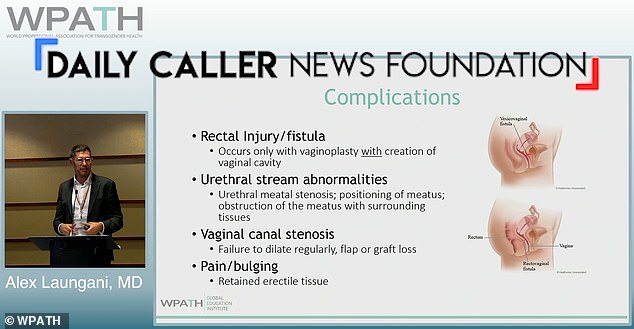
His presentation, obtained by the Daily Caller News Foundation, included this slide about the horrors of gender reassignment
Dr. Laungani, his Montreal-based clinic and WPATH did not return our requests for comment.
Advocates of trans medicine say it is lifesaving for a group prone to suicide. Procedures to remove breasts and alter genitalia help transgender people live authentically, they say.
But critics warn of a cult-like craze, with more and more transgender people coming out and undergoing risky procedures, while WPATH and other medical groups are hijacked by ideologues pushing reckless standards of care.
In the video, Dr. warns Laungani for an explosion of more and more clinics catering to the rising number of trans patients, where there is often “a lack of training and not proper training.”
This massive rollout gave trans patients “access to surgery” but at the expense of quality care, he said.
“It’s time to make sure we have the right training,” he said, calling for more fellowships.
Some medics performed trans surgeries so rarely that they were not “competent,” he warned.
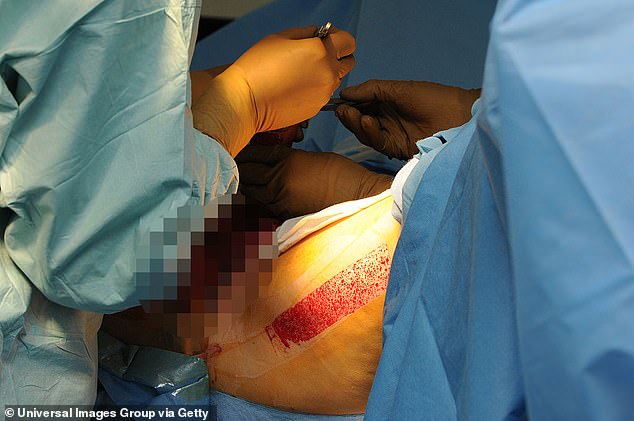
Creating a neo-vagina is associated with postoperative complications
They can botch procedures and leave patients with “complications,” he added.
Dr. Laungani said the results of delicate male-to-female genital surgeries, known as vaginoplasties, “can be quite bad.”
“The most feared complication is perforation of the rectum while dissecting the vaginal cavity,” he added.
“You’re very close to the rectum and it’s very hard,” he said.
Meat from the “abdomen, scrotum or large intestine” is used to rebuild the area, Dr. Laungani said.
Using tissue from the intestines has the greatest risk of “complications,” he said.
Patients have problems after surgery, he said. Surgical wounds reopen in more than three-quarters of cases.
Afterwards, many patients cannot achieve orgasm, he said.
Many need to ‘dilate’ their newly created vaginal canals with a vibrator-like device to prevent them from collapsing.
It’s “what the patients call a full-time job for the first few months because it’s four times a day,” he said.
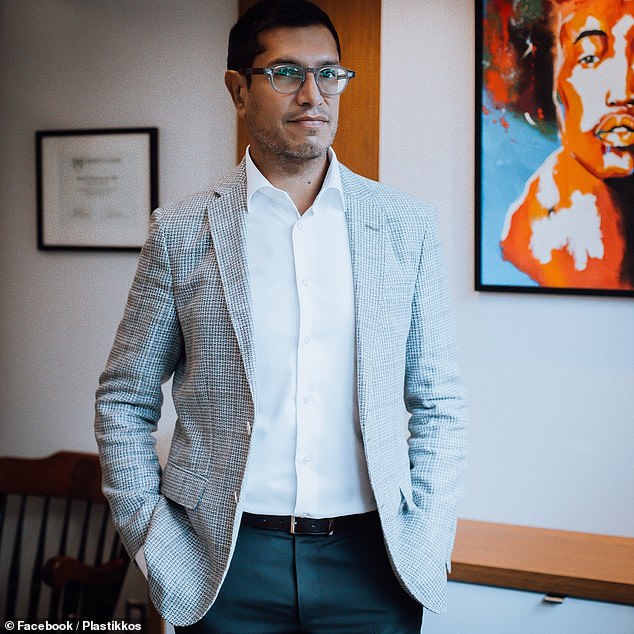
Dr. Laungani studied at the University of Liège, in Belgium, and worked at the renowned Mayo Clinic in Rochester, Minnesota
A slide from his presentation describes other horrors after surgery, including ‘recto-vaginal fistula, pelvic floor dysfunction and clitoral necrosis’ – when the sexual organ becomes flaccid and dies.
Laungani’s presentation was part of an educational series recorded in September 2022 for physicians seeking certification from WPATH, a top global authority on gender-affirming care, as it is known.
WPATH has come under increasing fire for promoting trans procedures that critics say are experimental, dangerous and performed on patients who simply need guidance.
The procedures are a hot topic in America’s culture wars, especially those against children.
Surgically altering male and female genitalia to match those of the opposite sex – known as vaginoplasties and phalloplasties – are widely regarded as difficult and problematic procedures.
Women transitioning to male may choose to have a penis made from tissue taken from their arms, although this procedure is also complex and the outcome still differs significantly from that of a biological penis.
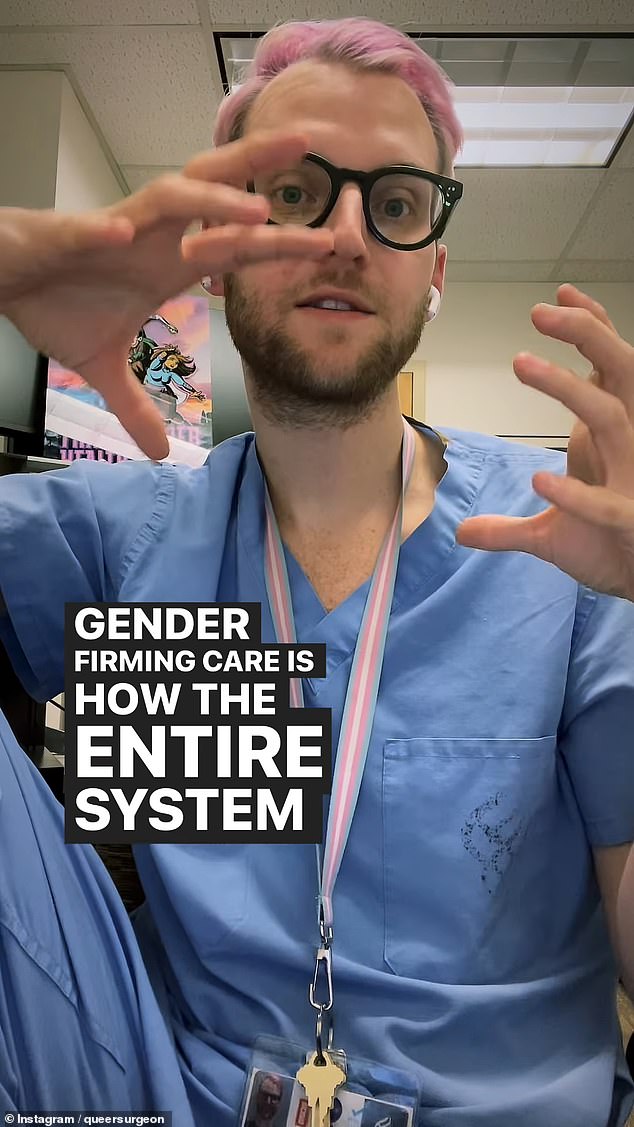
Dr. Blair Peters, a pink-haired plastic surgeon at Oregon Health and Science University, has tens of thousands of followers on social media
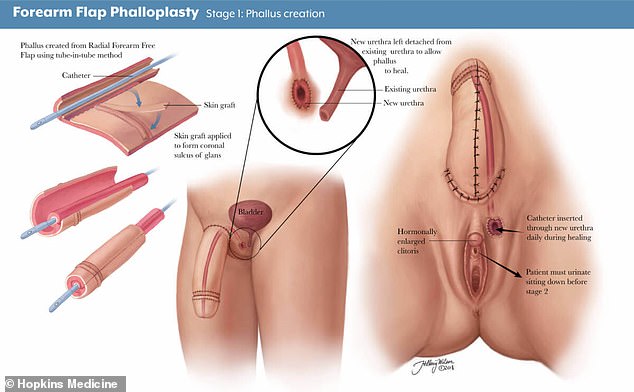
A phalloplasty procedure, as described in a medical textbook
Removing the breasts from female-to-male transitions is easier, but can also lead to pain, infections, and problems such as suture bursting, especially in overweight patients.
Dr.’s video Laungani is just the latest example of a trans expert telling uncomfortable truths about their lucrative, multi-billion dollar business.
Marci Bowers, a male-to-female transitioning surgeon and WPATH president, revealed how puberty blockers prevented trans patients in children and young adolescents from experiencing orgasms during conversations with colleagues.
“I mean, it’s really about zero,” she said during a 2022 seminar at Duke University.
Dr. Blair Peters, a plastic surgeon at Oregon Health and Science University (OHSU), revealed how trans children face a lifetime of infertility, incontinence and sexual misery after surgery.
In a video interview with a colleague, Dr. Peters said the techniques are still being refined and that “we are learning and figuring out what works.”
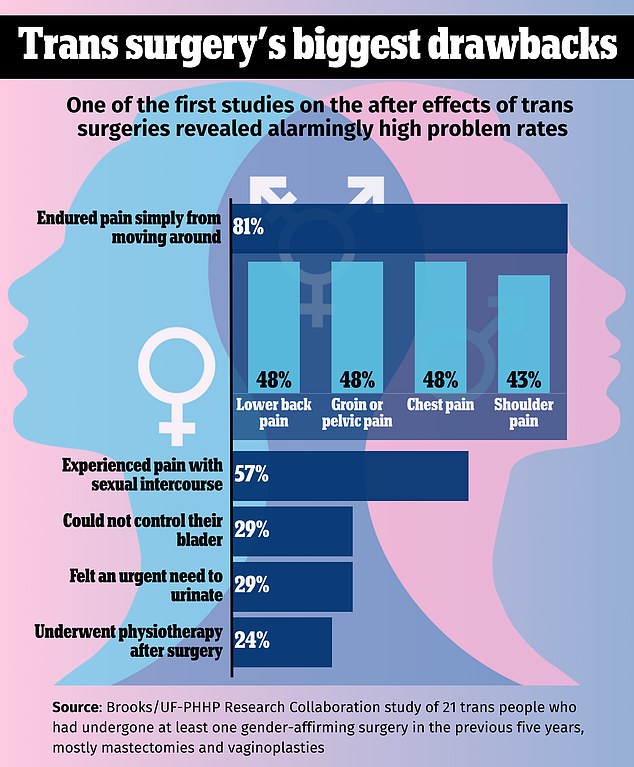
Most patients recovering from gender reassignment surgery experienced pain during intercourse
One of the first studies into the side effects of transgender surgery revealed alarmingly high rates of postoperative pain, pain during intercourse and bladder problems, raising troubling questions for this new frontier of medicine.
A large majority – 81 percent – of those who have undergone gender confirmation surgery in the past five years say they suffered pain from simply moving in the weeks and months after going under the knife.
Researchers from the University of Florida and Brooks Rehabilitation, a nonprofit health care organization, have shown that more than half of trans-surgical patients experience pain during sex, and nearly a third have no control over their bladder.
Trans medicine advocates present the surgeries as a trade-off, acknowledging the significant drawbacks but saying they are vital for people with severe discomfort with their own bodies.
Yet they are rare within the transgender community.
Of the estimated 1.6 million trans and non-binary Americans aged 13 and older, only 31 percent use cross-sex hormones and 16 percent opt for surgery, according to research by the Washington Post and KFF, a charity organization in the field of healthcare.
Most operations are breast removals during transitions from female to male.
